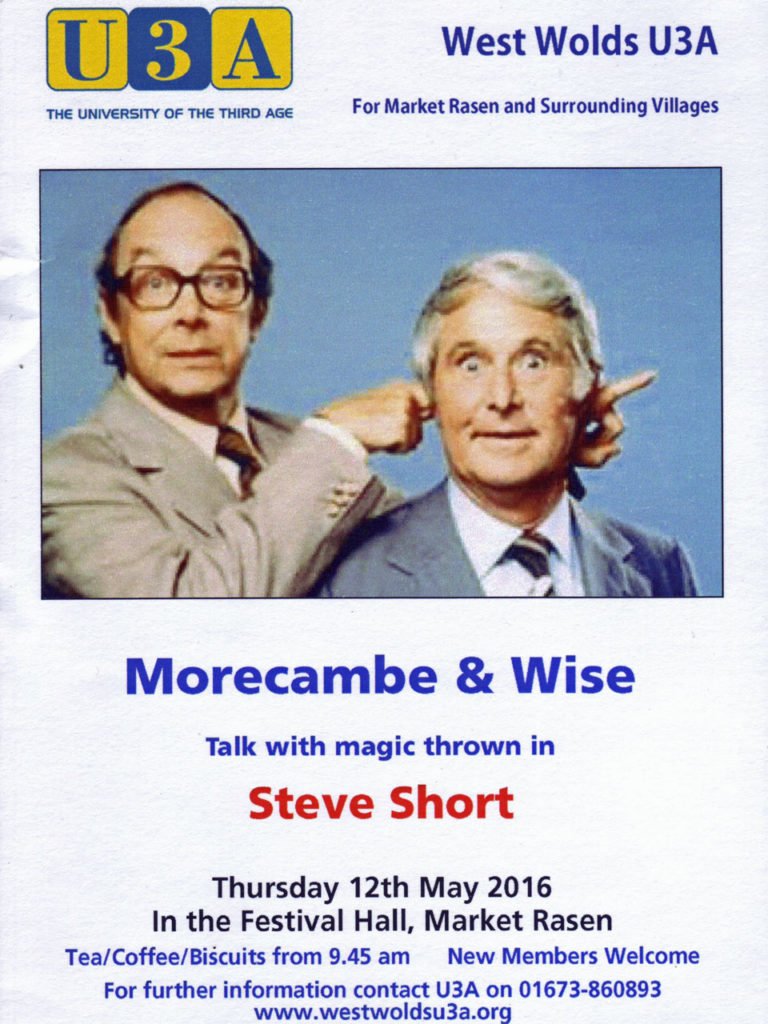Do you know what happens to your black bin rubbish? Well, 20 WW U3A members do, following a visit to Lincolnshire County Council’s Energy from Waste Centre at North Hykeham Lincoln. Rubbish is no longer (since 2013) used as landfill, but as a fuel to generate electricity.
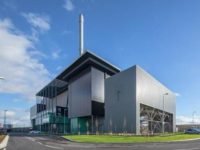 Lincolnshire, according to our very informative guide at the visitors’ centre, produces 365,000 Tonnes of rubbish annually.About half of this total is recyclable and compost-able. The remaining 170,000 Tonnes is used for conversion into energy. Street collection vehicles in West Lindsey deposit their black bin rubbish at one of 5 Waste Stations in the county ( probably at Gainsborough). From there, very large special vehicles take the rubbish to North Hykeham. On arrival as part of the closely monitored process the vehicles are weighed. After this these vehicles with a moving floor system deposit the rubbish into a deep pit and are then weighed empty on the way out.
Lincolnshire, according to our very informative guide at the visitors’ centre, produces 365,000 Tonnes of rubbish annually.About half of this total is recyclable and compost-able. The remaining 170,000 Tonnes is used for conversion into energy. Street collection vehicles in West Lindsey deposit their black bin rubbish at one of 5 Waste Stations in the county ( probably at Gainsborough). From there, very large special vehicles take the rubbish to North Hykeham. On arrival as part of the closely monitored process the vehicles are weighed. After this these vehicles with a moving floor system deposit the rubbish into a deep pit and are then weighed empty on the way out.
The rubbish is then loaded by skilful operators using giant grabs, into a hopper which feeds by gravity into the furnace running at 900 C. This is a continuous process where the rubbish is the fuel. The hot gases produced pass through boiler tubes to raise water in a closed system to superheated steam which expands through a turbine to drive the electrical generator in the normal way to supply 300+MW into the National Grid, (enough for 26,000 houses).
There is some waste in this whole process.The furnace has a shaking action which deposits ash and ferrous metal below it. The ash is used as an aggregate in road building and the metal is recovered for recycling. The flue gases are neutralised and particulates are removed, before being released up a 75 m chimney. Environmental control of the gases is a major part of the final process. Any solids removed are in the form of a fine powder which goes to make building blocks. There is scope in the plant design to use low grade heat presently released via fans, in a district heating scheme when funds permit.
Following our visit we drove to the nearby Pride of Lincoln pub for some R&R. Our next engagement was with the Lincolnshire Vintage Vehicle Society. A green 1940 Leyland Titan double-decker bus came from the Society’s Museum to the pub. We embarked, there followed some rearrangement of seating, as our volunteer driver was worried that most were upstairs and the centre of gravity needed lowering for stability.Reseated more evenly we set off for a tour of Lincoln. Tickets were issued by our volunteer conductor whilst the driver wrestled the bus through the narrow streets to stop outside the Cathedral for photos. We changed seating to give everyone a share of the topdeck and set off for the Road Transport Museum also in North Hykeham.
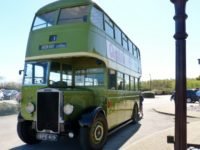 At the Museum we had time to wander amongst the collection of mostly buses, cars, motor-cycles and memorabilia displayed there. All these vehicles were functional; but behind the display area in the workshop it was a different story. There was much work in progress to be seen. One could not but admire the optimism of some of the Society’s members in tackling the restoration tasks they had set themselves. We did however see the outcome of much past effort and money spent, when the owner of an immaculate 1930’s SS model “Jaguar” proudly showed us his car.
At the Museum we had time to wander amongst the collection of mostly buses, cars, motor-cycles and memorabilia displayed there. All these vehicles were functional; but behind the display area in the workshop it was a different story. There was much work in progress to be seen. One could not but admire the optimism of some of the Society’s members in tackling the restoration tasks they had set themselves. We did however see the outcome of much past effort and money spent, when the owner of an immaculate 1930’s SS model “Jaguar” proudly showed us his car.
All too soon our day out came to a close. We were delivered back to the pub car park in an ex Co-op single decker. Thanks to Brian Ward for making all the arrangements which led to a different and most interesting day out with not too far to travel.
West Wolds
University of the 3rd Age
No longer working full time and live in the Mkt Rasen Area?
Want to learn or be creative? Want to stay active & meet new people?
40+ interest groups, visits, low subscription fees.
Monthly meeting with speaker at Mkt Rasen Festival Hall
2nd Thursday of the month doors open 9.30 – Everyone Welcome
POSTS
-
-
Up the Cut – Monthly Speaker
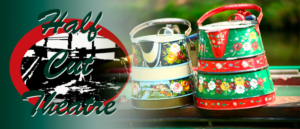 The Festival Hall was very busy with over 140 members in attendance. It was good to see so many people and obviously interested in inland waterways.
The Festival Hall was very busy with over 140 members in attendance. It was good to see so many people and obviously interested in inland waterways.The speaker, Derek Harris, was dressed for the part and set up a display of the various activities he undertakes including author of two books relating to life on the canal. For more information about Derek click here…
He was obviously a tried and tested speaker who captured his audience from the start. After a brief introduction he burst into song and much of the talk centred around not only the development of our waterways but also the meaning of the language in the songs. Bargies had a language of their own and their folk songs did need an explanation to get the most from them.
Derek covered the growth, demise and re-emergence of our waterways with humour and song. We all had a chance to join in on one of the songs – it’s always good to have a bit of audience participation just to make sure we hadn’t nodded off. For more on Canals click here…
Already looking forward to next month’s:
-
Digi photo group has been discussing how best to use your camera …
At our last group meeting, we repeated a session we had done at a much earlier meeting, when we just experimented with our cameras, testing just what all the controls actually did! Chatting with each other and explaining what we knew and asking about what we did not fully understand, proved to be really useful. So on a sunny but cold Sunday I went (very slowly!!) on a Stephenson’s coach to Bridlington …
As the day was so bright I added a polarising filter to the ultra violet one permanently fitted to the lens, along with a lens hood for much of the time. The problem with these is remembering that they cut off your corners when on the nearest lens depth! Apart from cropping and some automatic adjust, the photos seen












here are as taken – the point of the exercise was to take the views in different ways, through the camera setting, and not to revert to changing things in a programme afterwards. We had talked about depth of field and manual settings, so many shots were taken to try out these techniques. So what I took is what you see .. hope the contrasts are of interest.
PS: I titled the images and hoped the titles would come up when you hovered your mouse, but that doesn’t seem to have worked unfortunately.
-
Navel fluff is a thing of the past ….
West Wolds Belly Dancers are going from strength to strength, and our mystery photographer was recently granted privileged access to their Monday practice in a secret location, otherwise known as Middle Rasen Church Rooms. Here we see some of his captured images, published after severe scrutiny by the group’s leader and chief belly gyrater, Gillian Anderton.
-
RAF Scampton Fire and Heritage Visit
The U3A trip to RAF Scampton Fire Museum and Heritage Centre like all of Brian’s organised trips ran to time and delivered a variety of activities. It got off to an excellent start when we had the privilege of watching a solitary Red Arrow doing a test run before it was flown off to Greece to do their pre season final training.
Our tour of the RAF Fire Museum was very varied with vehicles and artefacts dating back hundreds of years. Our guide, Steve Shirley, was responsible for not only looking after the collection but also owned most of the items including all the 40 plus fire engines. His enthusiasm for everything to do with fire fighting was very infectious.
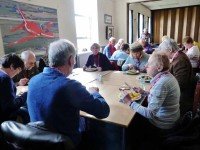 Even those of us who were only there for the lunch taken in the Junior Ranks Mess (it’s been a long time since any of us have been considered Junior) were captured by Steve’s passion.
Even those of us who were only there for the lunch taken in the Junior Ranks Mess (it’s been a long time since any of us have been considered Junior) were captured by Steve’s passion.So after a good lunch, sorry no tea or coffee because there was a power cut, we were back in the Heritage Centre.
The Heritage Centre had exhibits showing the history of the RAF from the Flying Corps of World War 1 to the Hawks currently flown by the Red Arrows with some large chunks of Lancaster bombers filling parts of the hanger. There was even an opportunity to sit in a mock-up Red Arrow with most people commenting on what a tight squeeze it was. I confess I was intrigued by the nuclear weapons that had been stored at Scampton during the cold war when Vulcan bombers were ready to scramble once the 4 minute warning came in. Did the residents of Lincoln know there was enough nuclear weaponry on their doorstep to wipe them out several times over?
At the end of an excellent day we were back on the coach and left behind a wind-swept RAF Scampton. Thanks again Brian for all your efforts.
-
Leprosy Mission Talk
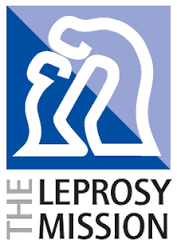 The speaker, Lynda King, started with a joke which is always a good sign. She then went on to tell the very human story of young people who contract Leprosy. The disease is endemic in India and although a great number of people carry the Mycobacterium not everyone will show symptoms which are extremely debilitating – numb hands and feet leading to skin cracking and if not treated the loss of digits. We learned that if caught it can be completely cured however if it is missed it can still be cured but the sufferer will always have lack of feeling in the affected part of the body and the skin will need to be oiled regularly throughout the day. A key factor in the spread of the disease is poor nutrition, lack of hygiene and education. For more details about Leprosy take a look at this Wikipedia link…
The speaker, Lynda King, started with a joke which is always a good sign. She then went on to tell the very human story of young people who contract Leprosy. The disease is endemic in India and although a great number of people carry the Mycobacterium not everyone will show symptoms which are extremely debilitating – numb hands and feet leading to skin cracking and if not treated the loss of digits. We learned that if caught it can be completely cured however if it is missed it can still be cured but the sufferer will always have lack of feeling in the affected part of the body and the skin will need to be oiled regularly throughout the day. A key factor in the spread of the disease is poor nutrition, lack of hygiene and education. For more details about Leprosy take a look at this Wikipedia link…At the end of the formal session there were several very good questions however on reflection the questions indicated that the speaker didn’t cover some essential points about Leprosy.
In summary Lynda made a very serious subject interesting and entertaining in a clear, confident and knowledgeable way. Everyone left the hall better informed.
If you have any thoughts about the talk please make a comment…
-
IT Workshops
 The Social Media and Web Design Group is changing. From now on it will be called “IT Workshops”. As you would expect a technology group wouldn’t stay the same for long. In future there will be a series of workshops covering topics such as Web Design, Social Media, Getting the most from a tablet, Apps for Smart phones, free software such as Libre Office to replace Microsoft and general discussions on technology. Each workshop will be limited to 5 people.
The Social Media and Web Design Group is changing. From now on it will be called “IT Workshops”. As you would expect a technology group wouldn’t stay the same for long. In future there will be a series of workshops covering topics such as Web Design, Social Media, Getting the most from a tablet, Apps for Smart phones, free software such as Libre Office to replace Microsoft and general discussions on technology. Each workshop will be limited to 5 people.The choice of these workshops will depend on you and what you want so if you’re interested in any of the above subjects or would like to cover something else then please let me know using the contact form on the IT Workshops Interest Group page.
You can call me on 07540 302603 or Text or WhatsApp me on the same number. If you don’t know what WhatsApp is then maybe you might like to sign up for one of the workshops.
From 8th March all workshops will be on Tuesday mornings 10:00 – 12:00 (2nd and 4th Tuesday of the month).
-
Winter Jazz on Sea
WINTER JAZZ IN DEVON
A small but perfectly formed group of our members set off from Market Rasen station one morning at the end of January, to travel to Paignton for a weekend of jazz and socialising. Checking in to our hotel on a wet Friday evening, we were re-vitalised by the first of the weekend’s excellent dinners, followed by the first of the weekend’s excellent sessions of lively music.
The whole event was well worth the travel involved, which went smoothly throughout, helped by the ‘assistance’ organised to move us and our bags between trains wherever we had to change. The weather the following days was fine enough to allow us to explore the town – two of our ladies even used their bus passes to reach Torquay – and we were all able to walk off the generous meals. All in all, an enjoyable time, with good company, good food, good music and a change from your average weekend at home!
-
Owlin’ Mad
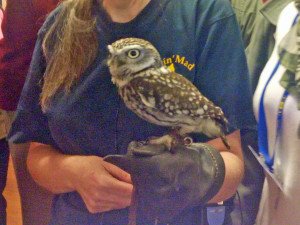 The event on Thursday 11th February saw a fascinating talk by Annette Mackenzie about owls and we were lucky enough to be introduced to Eric, the little owl and Boogie, the barn owl.
The event on Thursday 11th February saw a fascinating talk by Annette Mackenzie about owls and we were lucky enough to be introduced to Eric, the little owl and Boogie, the barn owl.The audience was spellbound by the owls and Annette described their behaviours and when and where we should expect to see these beautiful creatures.
-
U3A Summer Schools
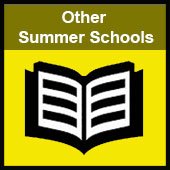 National U3A Summer Schools for 2016 will be held at
National U3A Summer Schools for 2016 will be held at
The Royal Agricultural University, Cirencester8th – 11th August 2016
15th – 18th August 2016The Summer Schools are now full with the exception of Folk Art Applique in week 1. Please ring 0208 466 6139 if you would like to book that course.
-
Quarterly Newsletter
 The December quarterly newsletter is now available on the web site. Please click here…
The December quarterly newsletter is now available on the web site. Please click here… -
Afternoon tea on a wet Friday in November …
-
Oddity spotting around West Wolds ….
-
Visiting Speakers 2016
 The provisional monthly talks are as follows:
The provisional monthly talks are as follows:
January 14th David Kew (member) – Ballooning
February 11th Annette Mackenzie – Owlin’mad
March 10th Lynda King – Leprosy Mission
April 14th Derek Harris – Up the Cut – the history of canals in word and song
May 12th Steve Short – Magician (TBC)
June 9th Heather Rosser – Families in the First World War (Copies of her book “In The Line Of Duty” for sale)
July 14th Julie Stevenson – Around the World in 365 days
August 11th Jane Barnes – Tales from a Farmer’s Wife (TBC)
September 8th Voice and Verse
October 13th Jannette Merilion – Calendar of Colour
November 10th A G MThe details may change so please keep an eye on events…
-
Visit to the Forest of Dean, October 2015.

